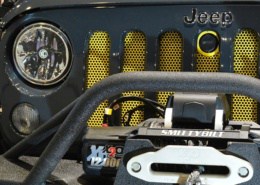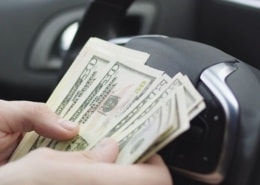The Cosigner Loan Car Dealer Scam
The cosigner loan scam is similar to a vehicle straw purchase. It can also present itself when attempting to buy a new car from a dealership or buying a used car.
The cosigner loan scam affects not only the cosigner but also the actual buyer of the vehicle.
What is the Cosigner Loans Scam?
This is when a customer tries to qualify for a car loan but does not have a credit history. The salesperson will ask the customer if they have a family member or friend with good credit, help them buy the car, or cosign.
When the cosigner gets to the dealership, the salesperson may tell them they’re only signing with the buyer as a reference to help the signer establish their credit. This is not true.
The person cosigning believes they’re helping a close friend or family member buy a car while assisting them in building and re-establish positive credit history. The actual buyer is unknowingly removed from the loan, and the cosigner becomes the sole buyer.
The cosigner is now left with all the responsibility of repaying the loan, and the actual buyer ends up not building any credit history or gaining anything from the transaction.
If you cosign on a loan, you take on the same responsibility as the signer.
The actual scam is when the original buyer is unknowingly removed from the loan, and the cosigner is the only one on the car deal.
This car buying scam is widespread and frequently occurs in car dealerships nationwide. It has many of the same characteristics and is very similar to a straw purchase, and it usually starts with the spot delivery car dealer scam.
How Does the Cosigner Scam Work?
Like most car-buying scams, there are several variations of how the cosigner loan scam is committed on unsuspecting car buyers.
Here are a few of the most typical methods that cosigner scam is used in a dealership.
1) Spot delivered by the dealership
The most common is when a car dealer knows upfront your credit history is so bad that there’s no way you’ll qualify for a car loan on your own. The dealer will lead you to believe you’ve been approved and everything is excellent. They’ll have you sign the contract and paperwork and let you take delivery of your new car. This is also a spot delivery in the retail car sales industry.
You’ll leave the dealership believing you bought a car and go about your life. After a few days, you’re called back by the dealer and told your financing fell through. You need to bring the car back or find a cosigner with great credit to go on the loan with you.
If you find a cosigner, you’ll have to return to the dealership and resign the paperwork. This is where you will be susceptible to the following two scenarios.
Suppose you can’t produce a cosigner. The dealer will attempt to switch you to a cheaper vehicle, or you will be sent home on the “hush puppy express” (walking).
2) The actual buyer is removed from the car loan
This technique also works when the car dealer knows, up front, there’s no way the actual buyer can be on the car loan no matter how good the cosigner’s credit is.
The dealer will deliver the car with you and your cosigner on the contract. The dealer will allow the vehicle to be driven by you for a few days, or longer, in hopes that you will not want to return the car.
After a week or so, the dealer calls and explains they could not get the car loan approved with you on loan. However, they could get the car loan approved using only the cosigner’s information and credit history.
The dealer is hoping enough time has passed and you’ve “fallen in love” with the vehicle. The dealer also hopes you will pull on your cosigner’s “heartstrings” to sign for the car on their own so the dealer won’t take the car away from you.
3) Signing multiple contracts and the paperwork shuffle
Lastly is having you and your cosigner sign numerous sets of paperwork. The finance manager will have you sign a contract and a bunch of paperwork by yourself and then have the cosigner sign their contract and paperwork.
The finance manager may have both parties sign the title application or other fake forms for show and effect. Signing the title app will make it appear that you’re on the title and registration and are legit. However, you will not get any positive credit, just parking violations.
To keep you or the cosigner from complaining or threatening a lawsuit because you’re not on the car loan at a later date. The finance manager will not give any copies to you, the buyer, and run any documents signed by you through the shredder as soon as you take delivery of the car.
How to Avoid the Cosigner Car Dealer Scam
- Have a good idea of how the auto finance process works. If you are financing a vehicle, you should have this arranged before visiting a dealership.
- Don’t let the finance department know more about your credit history than you do. Know your credit history before visiting a car dealership. Get and review your credit reports and scores from a reputable online company.
- Only finance a car with a dealership as the last resort; use reputable online financing companies to get a pre-approved auto loan online before contacting a dealership. You can use these companies’ free car loan quotes as leverage when negotiating interest rates with a dealership’s finance department.
- Always have both parties at the dealership sign paperwork at the same time. Never sign paperwork or contracts separately. You’re opening yourself up to become a victim of the cosigner loan scam.
- Never sign more than one contract at a time. Suppose you’re asked to sign another contract. Make sure you see the one you signed before being destroyed. Have them hand the contract paperwork to you and tear it up or take it with you to destroy it.
- Ask to see the auto lender’s approval. This letter will have both your name and your cosigner’s name on it, along with the approval requirements of your car loan.
- Carefully read everything you sign. Review the contract and ensure you’re both on the assigned and in the correct spots, signer, and cosigner.
- The Federal Trade Commission’s Trade Regulation Rule on Credit Practices requires a Notice to Cosigner form to be included with any motor vehicle retail installment contract or motor vehicle lease contract with a signer and cosigner involved. The Notice to Cosigner form notifies the cosigner they are equally liable for the debt if the signer does not fulfill the responsibilities of the contract. The cosigner should get a copy of this form and read it thoroughly before signing. Please keep a copy for your records after it has been signed.
- Keep and file copies of any paperwork you’ve both signed about purchasing a vehicle.
- Someone needing a cosigner has already proven they can’t or will not satisfy the requirements of a car loan. You may want to advise them to buy a cheap cash car and keep from acquiring more debt instead of cosigning a car loan.
- Do not let anyone pull at your heartstrings. If you doubt, you should not cosign for any loan.
- You should only cosign for a loan if you’re sure that you will be able to handle the added debt and can budget for the payment you’re cosigning for. It is the cosigner’s responsibility if the signer defaults and leaves you liable for the vehicle.









